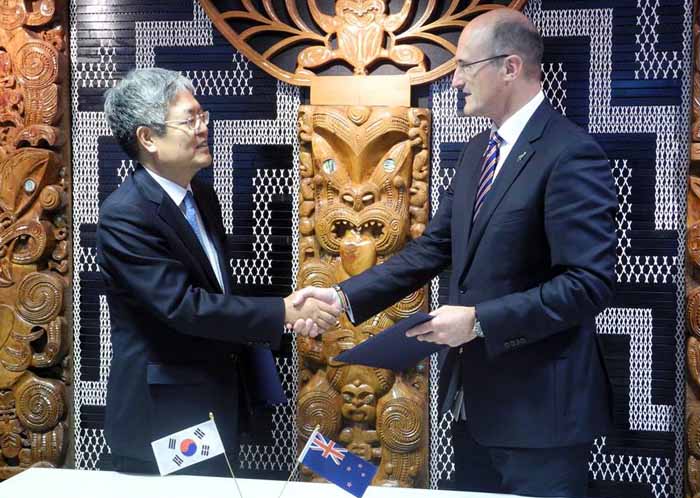A free trade agreement between Korea and China is set to come into effect on Dec. 20.
Over the next 20 years, the Korea-China FTA will eliminate tariffs on 92.2 percent of Korean goods that are exported there, and on 90.7 percent of Chinese products that are shipped to Korea.
The deal is expected to reduce tariffs on Korean exports to China valued at USD 8.7 billion annually, a move that will bring the nation a gradual tariff elimination worth some USD 45.8 billion over the next ten or so years.

The Ministry of Trade, Industry and Energy anticipates that over the next ten years the deal will lead to an additional 0.96 percent rise in the nation’s gross domestic product (GDP), bring consumer benefits worth approximately USD 14.6 billion and create more than 53,000 jobs.
“As this trade deal goes into effect, Korean industry will be able to branch out into China’s lucrative services market, such as legal services, engineering, environment evaluation and entertainment. The two governments will also now be able to expedite discussions on how to eliminate non-tariff barriers,” said an official from the trade ministry.
“More Chinese firms, as well as other enterprises from around the world, will take advantage of the benefits of this deal and expand their investment in industries here at home. This, in turn, will increase job opportunities across many fields,” the official said.
Also, Korea and New Zealand have agreed to put their free trade agreement into effect on the same day. Bilateral trade volume between the two countries has increased by 10.4 percent on average over the past five years, with last year’s volume reaching about KRW 3.3 trillion. The deal will lower tariffs on goods traded between the two nations twice, first on the day that it goes into effect and then on New Year’s Day. With two rounds of tariff cuts within such a short period of time, the two economies will see a much greater volume of bilateral transactions in the future.
According to New Zealand Trade and Enterprise (NZTE), tariffs that New Zealand companies had to pay on their exports to Korea will phase out over the next 15 years. In particular, tariffs on some of Korea’s favorite imports from New Zealand, such as deer antlers, kiwis, wine and sweet pumpkins, will plummet or will be completely eliminated.
Such drastic tariff cuts will also benefit Korean consumers, as they can now buy farm and fishery products, and tires and other automobile parts, from New Zealand at more reasonable prices.

By Sohn JiAe
Korea.net Staff Writer
Photos: Yonhap News, the Korean Embassy in New Zealand
jiae5853@korea.kr
Over the next 20 years, the Korea-China FTA will eliminate tariffs on 92.2 percent of Korean goods that are exported there, and on 90.7 percent of Chinese products that are shipped to Korea.
The deal is expected to reduce tariffs on Korean exports to China valued at USD 8.7 billion annually, a move that will bring the nation a gradual tariff elimination worth some USD 45.8 billion over the next ten or so years.

Representatives from Korea and China exchange diplomatic letters in Beijing on Dec. 9. The letters mark the beginning of a free trade deal between the two countries. Pictured (left) is Kim Jang-su, Korean ambassador to China, as he exchanges letters with a representative from the Chinese Ministry of Commerce.
The Ministry of Trade, Industry and Energy anticipates that over the next ten years the deal will lead to an additional 0.96 percent rise in the nation’s gross domestic product (GDP), bring consumer benefits worth approximately USD 14.6 billion and create more than 53,000 jobs.
“As this trade deal goes into effect, Korean industry will be able to branch out into China’s lucrative services market, such as legal services, engineering, environment evaluation and entertainment. The two governments will also now be able to expedite discussions on how to eliminate non-tariff barriers,” said an official from the trade ministry.
“More Chinese firms, as well as other enterprises from around the world, will take advantage of the benefits of this deal and expand their investment in industries here at home. This, in turn, will increase job opportunities across many fields,” the official said.
Also, Korea and New Zealand have agreed to put their free trade agreement into effect on the same day. Bilateral trade volume between the two countries has increased by 10.4 percent on average over the past five years, with last year’s volume reaching about KRW 3.3 trillion. The deal will lower tariffs on goods traded between the two nations twice, first on the day that it goes into effect and then on New Year’s Day. With two rounds of tariff cuts within such a short period of time, the two economies will see a much greater volume of bilateral transactions in the future.
According to New Zealand Trade and Enterprise (NZTE), tariffs that New Zealand companies had to pay on their exports to Korea will phase out over the next 15 years. In particular, tariffs on some of Korea’s favorite imports from New Zealand, such as deer antlers, kiwis, wine and sweet pumpkins, will plummet or will be completely eliminated.
Such drastic tariff cuts will also benefit Korean consumers, as they can now buy farm and fishery products, and tires and other automobile parts, from New Zealand at more reasonable prices.

Korean Ambassador to New Zealand Kim Hae-yong (left) shakes hands with Martin Harvey, chief FTA negotiator from the New Zealand Ministry of Foreign Affairs and Trade, on Dec. 9 in New Zealand. They just exchanged diplomatic documents to confirm that the Korea-New Zealand FTA will go into effect on Dec. 20.
By Sohn JiAe
Korea.net Staff Writer
Photos: Yonhap News, the Korean Embassy in New Zealand
jiae5853@korea.kr
